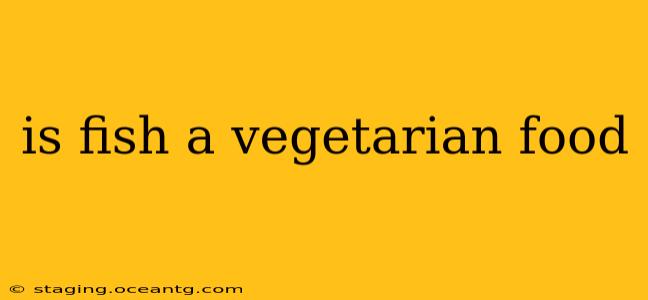The simple answer is no, fish is not a vegetarian food. Vegetarianism, by definition, excludes the consumption of animal flesh. Fish, being an animal, falls outside the boundaries of a vegetarian diet. However, the question often sparks a deeper discussion about dietary choices, ethical considerations, and the nuances of different dietary lifestyles. Let's explore some frequently asked questions surrounding this topic.
What is Vegetarianism?
Before delving deeper, it's crucial to define vegetarianism. Vegetarian diets primarily consist of plant-based foods, including fruits, vegetables, grains, legumes, nuts, and seeds. There are different types of vegetarian diets, ranging from lacto-ovo vegetarian (including dairy and eggs) to vegan (excluding all animal products, including honey). The common thread is the exclusion of meat, poultry, and seafood.
Is Fish Considered Meat?
Yes, fish is considered meat. While it might be perceived differently due to its aquatic nature, fish is animal flesh. It's derived from animals and, therefore, contradicts the core principle of vegetarianism.
What About Pescatarianism?
Pescatarianism is a dietary pattern that includes fish and seafood but excludes other meats. It's often considered a semi-vegetarian diet. Individuals following a pescatarian diet still consume animal products, so it's distinctly separate from vegetarianism.
Are There Any Overlapping Beliefs Between Vegetarians and Pescatarians?
While their dietary choices differ, vegetarians and pescatarians often share similar concerns about ethical treatment of animals, environmental sustainability, or health benefits associated with plant-based eating. Many pescatarians might align with some vegetarian values, but not the complete exclusion of all animal products.
Why Do Some People Confuse Fish and Vegetarian Diets?
The confusion might stem from several factors. Some individuals may misunderstand the precise definition of vegetarianism. Others might be unfamiliar with the nuanced distinctions between various dietary patterns, such as pescatarianism and vegetarianism. Lastly, marketing and labeling of certain food products sometimes blur the lines, leading to misconceptions.
What are the Ethical Considerations Regarding Fish Consumption?
Ethical concerns surrounding fish consumption are increasingly prevalent. Overfishing threatens marine ecosystems, while certain fishing practices cause significant harm to marine life. Many vegetarians choose to exclude fish from their diets due to these concerns, aligning their food choices with their values and beliefs about environmental responsibility and animal welfare.
Conclusion:
While the initial question is straightforward—fish is not vegetarian—the topic opens a broader conversation about dietary choices, ethical considerations, and the complexities of different eating patterns. Understanding the nuances of vegetarianism and related diets allows for clearer communication and informed decision-making regarding personal dietary preferences.
